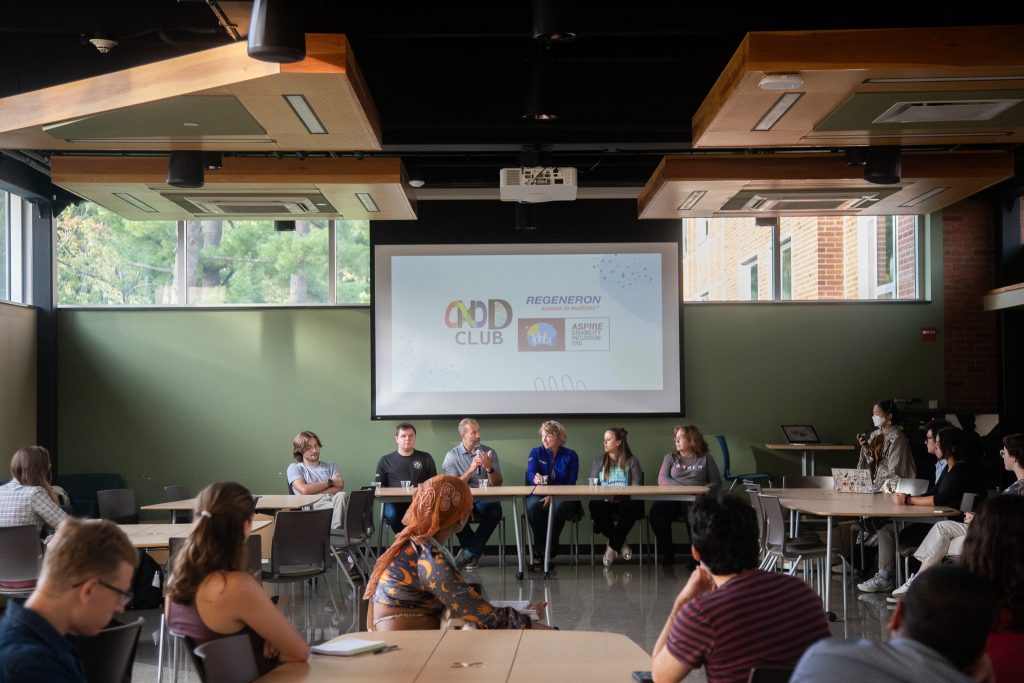Regeneron, a biotechnology company, teamed up with Binghamton University’s Neurodiversity Club this week to host a panel spotlighting the company’s ASPIRE-DI program, which promotes accessibility for those with disabilities in the workplace.
The company develops transformative medicines and research technologies and won an award for Best Place to Work for Disability Inclusion in 2023. The panel, held Monday night in the Old Champlain Atrium, highlighted the ASPIRE-DI program, which stands for “Accommodations and Support Promote Inclusion at Regeneron for Everyone — Disability Inclusion.” The program’s purpose is to ensure that everyone at the company can work comfortably and efficiently with specialized accessibility options rather than relying on generalized accommodations that do not account for individual employees’ needs.
The panel told the story of the program’s main founder, a wheelchair-bound chief scientist who advocated for his own accommodations with the company’s support. The panel elaborated on accommodations Regeneron provides, including access to quiet rooms. When designing their buildings, the company consulted with facilities engineers to create a comfortable and positive space.
Regeneron began collaborating with the Neurodiversity Club last year when Alex Steele, a member of the company’s University relations program, connected with Brian Flynn ‘24, a former Neurodiversity Club vice president, during a career fair. Steele looked at Flynn’s resume and saw he co-founded the club, it “stuck with him,” because several of his coworkers were a part of ASPIRE-DI’s predecessor organization, ARIES. After meeting, Steele and Flynn collaborated on ideas for campus events, which led to the first Regeneron event last year.
Flynn is now a Regeneron employee and described several accessibility options he took advantage of to work comfortably.
“They give you different safety glasses,” Flynn said. “So, for example with me, this is my first time working nights, so I have a hard time sometimes staying awake, especially when I’m sitting. So, one of the accommodations they have is different safety glasses. One of the safety glasses they have will have a blue tint on it so that way, it always looks like a bright sunny Binghamton day which we don’t usually get here.”
Flynn added one could choose to use disposable earplugs or earmuffs for sound muffling, depending on the needs and demands of the job at hand.
Jubilation Yeh, the club’s president and a junior double-majoring in chemistry and environmental science, said the event had a good turnout.
“I would say I think it’s going a bit better,” Yeh said. “It seems like a lot more people are talking to each other, even outside of the networking portion. Ultimately at the end of the day, the Neurodiversity Club, we are here to create a community. So, whatever people get out of this, whether it’s an increased network or a bigger community, we’ve succeeded.”
The ASPIRE-DI program is one of several Employee Resource Groups offered by Regeneron. They aim to encourage employees from different backgrounds to connect and share opportunities to foster a more inclusive work environment. Students who were interested in the ASPIRE-DI program and Regeneron spoke with the panel members to gain further insight.
“I think it’s really interesting to learn about accommodations in the workplace, especially as a neurodivergent person, because it gives me a bit of peace knowing that there are accommodations out there and there are people looking out for you even in the workplace,” said Mallory Kosiba, a sophomore majoring in psychology.



